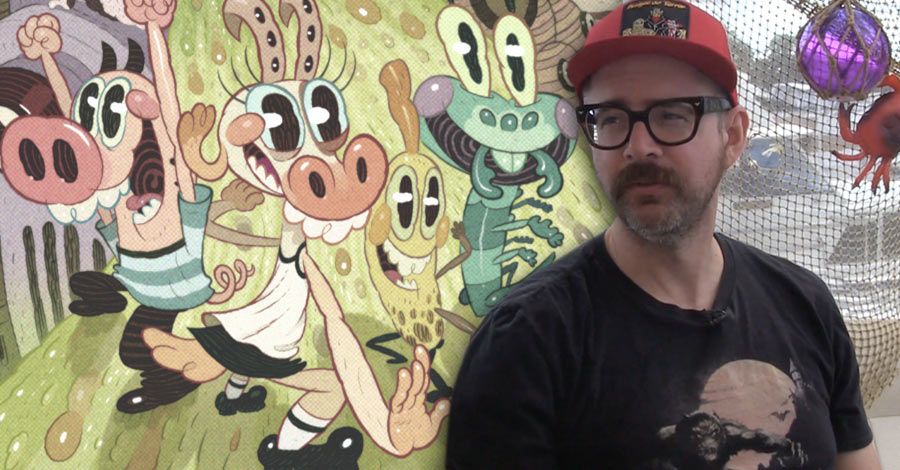Cartoonist Johnny Ryan has made a name for himself by using his offbeat style of humor to bust taboos and tell some very strange and often very adult stories. He's best known for books including "Angry Youth Comix" and "Prison Pit" as well as comics and illustrations in "Vice." At first glance, it might be surprising to learn that he's now spending his days working on the new Nickelodeon animated series "Pig Goat Banana Cricket," which he co-created with Dave Cooper. But after further inspection of the series' protagonists and its subject matter, the series is vintage Ryan, just for an all-ages audience.
RELATED: Ryan Goes To "Prison"
Ryan took some time at Comic-Con International in San Diego to board the world famous CBR Yacht and sit down with Kiel Phegley to discuss his current workload, his approach to animation, and what aspects of his sensibilities work for both kids and adults.
On whether the show signals him getting tired of gag-style comics or if it's just another weapon in his arsenal:
Johnny Ryan: I still do stuff for "Vice" magazine pretty much every month, and that's pretty -- it's not X-rated, but it's humor for adults most of the time -- all the time. So I still do it, and I'm still working on "Prison Pit," I just don't have as much time to do it as I used to. I just always have an ability to sort of compartmentalize stuff, and I like to do different things. I still like to do funny gag stuff for adults over here, and I like to do more like darker, Lovecraftian MMA stuff over here, and I like to do like goofy, "Looney Tunes" kids stuff over here. I think it's ridiculous that anybody needs to [say] I'm just this one guy that does one thing. People do all sorts of -- you can do many things. You shouldn't be boxed in. It's more fun.
On whether the adult nature of his earlier work made it hard for him to break into animation:
I'm sure there was, but it was never really brought up or made an issue. To Nickelodeon's credit, they were the ones who sort of came to Dave Cooper and I -- Dave Cooper, the co-creator of the show -- and Dave's work is also very adult. His comic work is very adult, it's sort of a different kind of adult. But I think Nickelodeon, they saw the work that we had done for kids -- Dave Cooper and I collaborated on several children's comics for "Nickelodeon" magazine -- and they saw them and they were like, "Hey, this has a really cool look to it, it's funny, it's got strong characters. What do you guys think of developing this into something?" And so, at the time, I was just kinda like -- I'm one of these guys that if somebody offers me work I take it -- so I was sort of like, "Okay, let's try it out, see how it goes." And it was just sort of like a process of let's see if this goes anywhere, you know. It actually wound up going somewhere.
On why so many cartoonists have made the jump to animation:
Comics, it's sort of feast or famine. I didn't make a living just off my comics. I was doing comics, I was doing illustration for "Vice" and comics for "Vice" and stuff for "Bloomberg Businessweek" and "Runner's World"; characters design for some TV development thing. If you want to actually try to make a living doing this you've gotta be able to do as much as you possibly can. You can't just live off of doing your comic unless -- there's probably like five guys in the world, you know, who are able to do that. Dan Klowes, Chris Ware, right off the gate they're great artists who immediately get a great, solid following and they can just do it. I think most of us have to hustle and get like a lot of gigs going at the same time.
On what parts of his comedic sensibilities work regardless of the intended audience:
I think both for my kids stuff and my adult stuff, it's just like they both have that same sense of nonsense; that sort of like completely bizarro, nonsensical humor that I have. It's just kind of like the content is slightly altered. So instead of Doctor Strange's penis, I'll do pizza and boogers and, you know... weird mutant monster things. With Nickelodeon, they have certain parameters of which you have -- there's certain things you can't do. Within those parameters, we're trying to -- we're not sort of thinking, "Oh, I wanna make this show for the 10-12 year-old demographic." We're thinking, Nickelodeon has given us these guidelines, how can we make the funniest show we possibly can that makes us laugh? That's how we approach it, because I don't think I'd be able to do it if I was like, "What does Billy in Iowa, 13 years-old, what does he want to watch?" I can only answer what am I gonna laugh at.

